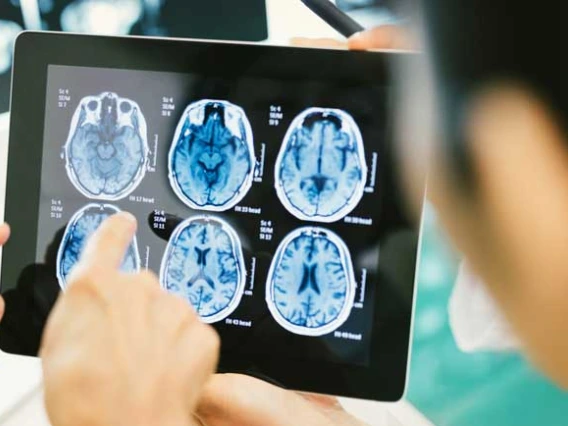Neuroscience and Cognitive Science
Bachelor of Science
Quick Facts

Top 5%
Online Bachelor's
Program in the Nation
- U.S. News & World Report, 2026
TOP 25
Public Flagship
University
- U.S. News & World Report, 2024
Would you like to study in a field that is pushing the frontiers of science? Ready to study the brain and nervous system as they drive cognition, behavior, emotion and consciousness? Through the BS in Neuroscience and Cognitive Science, you can explore the amazing complexity of the brain, its important role in developmental disorders, and the devastating effects of injury. You will have the opportunity to engage with new technologies that have facilitated exploration at levels that were impossible only a few years ago.
The BS in Neuroscience and Cognitive Science includes a gateway course NSCS 200: Fundamentals of Neuroscience and Cognitive Science and a common set of core courses that provide a solid foundation in both Neuroscience and Cognitive Science. Upon completion of these core requirements, you will then choose one of two focus areas: Neuroscience or Cognitive Science. Upper division courses within each focus are designed to enhance your knowledge and skills in the chosen content area.
Finally, you will pursue a series of elective courses in your area of emphasis, either Neurobiology or Cognition, allowing you to customize the program to your own interests and develop your knowledge in particular themes of neuroscience or cognitive science.
This rigorous curriculum is designed to prepare you for a variety of careers in health and research-related fields.
*Residents of some U.S. Territories may not be eligible. Please see our Eligibility & State Authorization page for more information.
This degree consists of 120 credits total. Core courses include a gateway course. All students choose a focus, consisting of six credits, and an emphasis, consisting of 15 credits. Research and independent study can be used for up to six of the 15 credits required to complete an emphasis.
This course will introduce the principles of neuroanatomy, neurophysiology and cognitive science. Topics will be addressed with material from philosophy, psychology, computer science and neuroscience, and will incorporate data from work with animals, humans and machines.
Examine properties of individual neurons followed by study of how these cells function in circuits and how circuits can change with experience. This course emphasizes the importance of experimental data and model systems to understand the functions of cells in the nervous system.
This course will introduce you to experimental methods in neuroscience, including computer simulation modeling of neuronal activity and selected experimental techniques commonly used in neuroscience.
This course will introduce computer programming in MATLAB, a practical high-level computing language freely available on campus and commonly used in Neuroscience and Cognitive Science research.
Cover the major themes and issues in Cognitive Science, with an emphasis on philosophical foundations, cognitive architecture, and modeling approaches.
In this course, you will be introduced to experimental methods in cognitive science and cognitive neuroscience including computer modeling and selected experimental techniques, including neuroimaging, measurement of event-related potentials, eye tracking, TMS and monitoring of autonomic nervous system function.
Outcomes
Skills
Earning your Bachelor of Science in Neuroscience and Cognitive Science will build core skills, including:
- Critical thinking
- Brain and behavior problem solving
- Self-initiated learning
- Discovery in cognitive science
- Discovery in neuroscience
- Formal scientific literature evaluation
- Evaluating scientific results
- Mass media evaluation
- Effective communication
- Scientific research ethics
- Ethical scientific decision-making
- Understanding brain behavior
Potential Career Paths
Graduates of the BS in Neuroscience and Cognitive Science will have different career outcomes depending on the focus area they choose. The following list incorporates career outcomes for both focus areas:

Courses in the Neurobiology focus will hone in on the molecular, genetic and cellular bases of neural function. You will study genetics, human and animal behavior and development, neural networking and more. You may use the Neurobiology focus as a stepping-stone to medical school, research ventures or careers in biotechnology, non-profit research foundations, or science writing.
Courses in this focus include:
This course provides an in-depth exploration of the principles of organization of nervous systems, with a special emphasis on the functional organization of the human brain. Through lectures, in-class discussion of required reading assignments, and class projects, students will learn about the basic anatomical ground plans of the brains of species ranging from flies to humans and then focus on the details of the organization of the sensory and motor systems and neural circuits that control certain complex functions in humans. The cross-species comparisons will highlight fundamental concepts as well as key neuroanatomical specializations that match a particular organism's behavior to its environment.
This is an introductory course to the relationship between the functional organization of brains and signals in the animal world that elicit brain function resulting in behavior actions. The course will provide students with an appreciation of strategies used to observe, analyze and study brain organization, relating this to the study of animal behavior, particularly those behaviors involving social and sexual interactions within a species.
This course is designed to provide a solid grounding in mechanisms of learning and memory at the molecular, cellular and behavioral level. A combination of lectures and discussions of research papers will comprehensively discuss the current state of knowledge regarding the neurobiological basis of learning and memory derived from invertebrates to mammalian model systems. The course will discuss topics including the biochemical basis of cellular information processing, genes and gene regulation in memory formation, the role of long-term changes in synaptic connections for memory, multimodal signal integration at the molecular level and its role in memory, and biochemical mechanisms of information storage.
This course will provide seniors with detailed hands-on laboratory experience in recording electrical signals from living cells. Advanced preparations and data analysis including spike sorting will be covered.

The Cognition focus concentrates on higher-order functions in the brain including decision making, reasoning, language, attention, perception, memory, and consciousness. Courses also cover brain disorders that disrupt cognitive functioning. This fous is designed for students who are contemplating careers in medicine, law, business, marketing, research and teaching, neuro-rehabilitation, or social and home care services.
Courses in this focus include:
This course will cover technological concerns that include interaction styles, devices, constraints, affordances, and metaphors. Theories, principles and design guidelines will be surveyed for both classical and emerging interaction paradigms, with case-studies from practical application scenarios. This course is co-convened: Upper-level undergraduates and graduate students are encouraged to enroll. Graduate students will be expected to complete more substantial projects and will be given more in-depth reading assignments.
This course surveys bilingualism from a variety of perspectives: linguistic, cognitive, social, and instructional and addresses such questions as: Do bilingual speakers "turn off" one language while they speak the other? Does acquiring two languages affect children's academic performance? Are the two languages completely separate or mixed together in the bilingual mind (and brain)? What is the best way to learn a second language?
You will be introduced to cognitive science; current issues relating to minds as computers, neuroscience, vision and language.
Examine biological, psychological, and social issues in aging, including brain changes with age, cognitive change with age, and the social impact of increasingly older population demographics.











